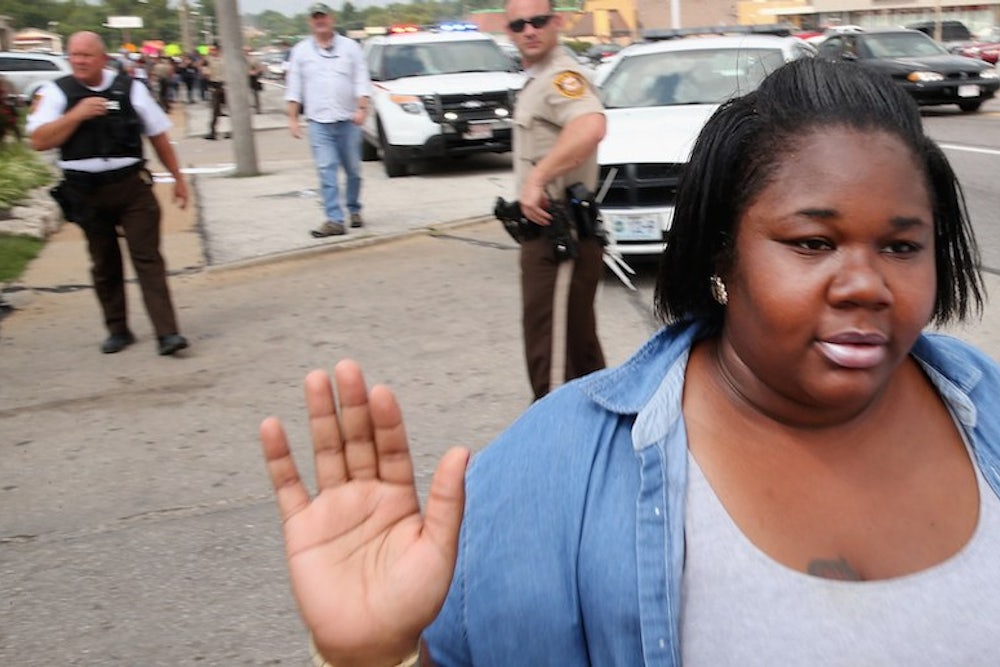For a brief moment last week, it appeared as if the fatal shooting of Michael Brown wouldn’t divide the public across the same, predictable line that split the country between those who believed Trayvon Martin had been killed by a reckless vigilante, and those who treated George Zimmerman as an inspirational folk hero.
But that’s all changing now.
Some conservatives didn’t waste a moment before they began stoking white resentment. But their efforts were confounded by the early picture emerging out of Ferguson, Missouri: Michael Brown, 18, was unarmed. The police officer who killed Brown had confronted him for jaywalking. Brown was running for his life when he collapsed in a hail of gunfire. He was supposed to begin college this fall. The Ferguson police initially refused to release any information about the confrontation, aside from a tendentious version of events presumably provided by the officer involved, whose name they withheld for days. And when the community revolted, the Ferguson and St. Louis County police transformed into a paramilitary outfit determined to crush the demonstrations by, among other things, denying residents and the media their freedoms of speech and assembly.
Under those circumstances, only authoritarian dead-enders, and those inclined to believe that assemblages of black people are inherently dangerous, initially aligned with police against Brown, his family, and the black community in Ferguson.
But everything that's happened since has helped to restore a familiar allegiance between resentful whites and "rule of law" conservatives. Governor Jay Nixon announced that Captain Ron Johnson of the state highway patrol—a black Ferguson native with strong ties to the community—would take command from the Ferguson police chief. After one night of calm, looters joined the protesters. The Ferguson police, under immense pressure, released the name of the officer who shot Brown—Darren Wilson—along with video footage of a hulking Brown strong-arming a much-smaller convenience store clerk over a stolen box of cheap cigars minutes before he died. Two autopsies also suggest that Brown was facing Wilson when the fatal shot penetrated his skull.
For many (mostly white) conservatives, these developments tell the whole story: The protesters and looters would have cleared the streets if Johnson, who stressed open communication over brute force, hadn’t been put in charge; and Brown was a thug, who only died because he didn’t follow police orders.
Over the weekend, a pro-Wilson protest gathered outside of a local TV station in St. Louis.
"If you do what the police tell you do—if you're not doing anything wrong, and the cops ask you to do something, then you're not going to have nothing to worry about," a protestor named Michael Bates told Huffington Post.
Another protestor, a retired St. Louis County police officer compared “violent protesters” to dogs. “It’s as simple as training your dog. If you don't tell them stop biting, guess what, he's going to continue to bite."
On the far right, the circumstances of Brown’s shooting have disappeared behind the backdrop of Brown’s character. Replacing them is a suggestion that Brown was archetypal—a kind of young black man that white people, even white police officers, are correct to fear and treat as dangerous.
Many on the right have been more circumspect. Rather than leap to conclusions about Brown and Wilson, National Review editor Rich Lowry, to take just one example, blamed the emergence of looters on “policing…dictated by MSNBC,” and suggested a return to more aggressive tactics. (That was two days ago. In the interim, he got his wish, and it didn’t go over so well.)
All of this helps explain why Barack Obama's Thursday comments were so tepid and brief. For days now, and to differing degrees, each new development has steered the public’s reaction to Ferguson toward a sadly predictable state of polarization. And that's happened without a fresh word from the president.
